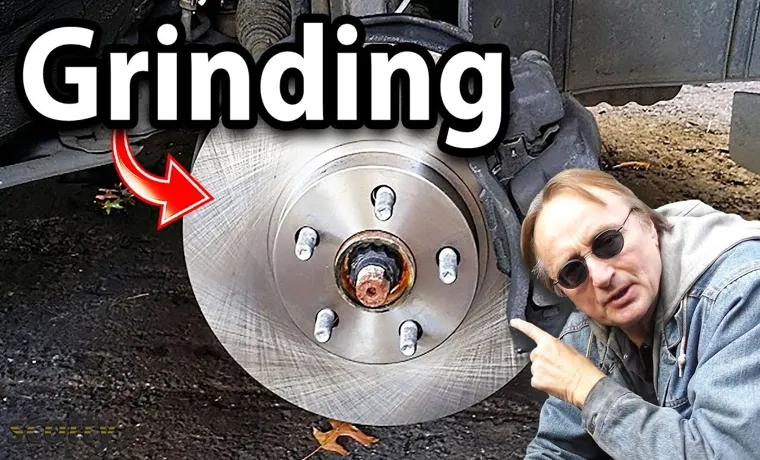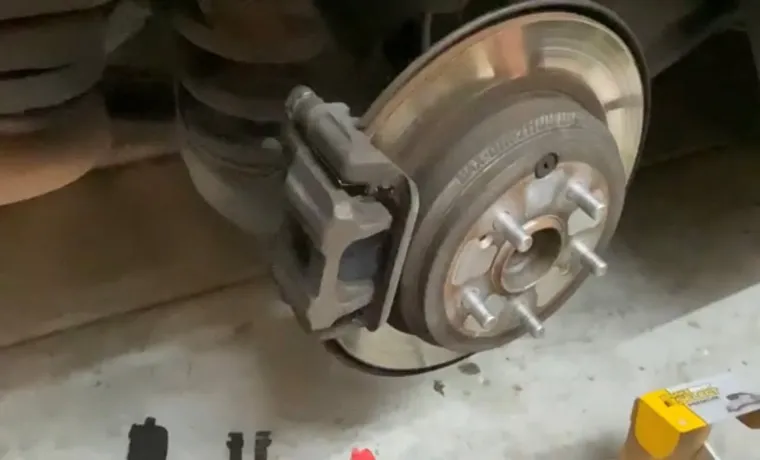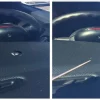Can you hear a disturbing grinding noise coming from the rear of your car when you apply the brakes? If so, you might be experiencing one of the most common brake problems known as back tire grinding noise. This noise can be caused by several factors, from worn brake pads to faulty wheel bearings, and ignoring it can be dangerous. To diagnose the root of the problem and fix it before it escalates, you need to identify the source of the sound.
It can be tricky as different sounds might indicate different issues. However, by paying attention to what you hear and gathering as much information as possible by observing your car’s behavior, you’ll be able to determine the cause of the noise. In this article, we’ll discuss different ways to diagnose back tire grinding noise when braking and provide you with some tips on how to recognize the problem to fix it quickly and efficiently.
We believe that you don’t need to be an expert to understand what’s going on in your vehicle, and that’s why we’re here to help you through the process.
Table of Contents
Identify the Type of Noise
If you’re experiencing a back tire grinding noise when braking, it’s important to identify the type of noise to determine what may be causing the issue. First, you should pay attention to the sound of the noise. Is it a high-pitched squeal or a low, rumbling sound? A high-pitched squeal could indicate that your brake pads are worn down and need to be replaced.
On the other hand, a low, rumbling sound could mean that your brake disc is warped, which could be caused by an uneven wear pattern or overheating. Another indicator of the type of noise is when it occurs. Does the noise happen only when you apply the brakes, or does it continue even after you release them? If the noise only happens when you brake, it’s likely an issue with your braking system.
However, if the noise continues after you release the brakes, it could suggest there’s something else going on with your tire or suspension. It’s important to get your vehicle inspected by a professional mechanic if you’re experiencing any unusual noises or issues with your brakes. Ignoring the problem could lead to further damage and put you and other drivers at risk on the road.
So, if you’re hearing a back tire grinding noise when braking, make sure to identify the type of noise and get your vehicle inspected as soon as possible to ensure your safety while driving.
Grinding Noise
If you’re hearing a grinding noise in your vehicle, it’s important to identify the type of noise in order to determine the root cause. Grinding noises typically occur when metal is rubbing against metal, which can be a sign of serious problems. One of the most common causes of grinding noises is worn brake pads or rotors.
If you hear a grinding noise when you apply your brakes, it may be time to replace your brake pads. Another cause of grinding noises can be a damaged wheel bearing. In this case, the grinding noise will be more consistent as you drive.
A third potential cause of grinding noises is a damaged transmission. If you hear grinding noises as you shift gears or when your car is in neutral, it’s time to take your vehicle to a mechanic for further inspection. By identifying the type of grinding noise, you can take the necessary steps to ensure that your vehicle stays in good working order.

Squeaking Noise
When it comes to identifying a squeaking noise, there are a few different types you might hear. The first type of squeak is likely coming from your brakes. If you hear a high-pitched, shrill noise when you press the brake pedal, it’s likely your brake pads need to be replaced.
A grinding noise when you brake could also mean your brake pads are worn down, and you need new ones ASAP. Another type of squeak you might hear is coming from your suspension system. If you hear a creaking noise when you drive over bumps or turn, it could mean you need to have your suspension checked.
Additionally, a loose or damaged belt can also cause a squeaking noise. If you hear a high-pitched whine coming from under your hood, it could be your serpentine belt. In any case, if you’re experiencing a squeaking noise, it’s important to have your car inspected by a professional to ensure your safety and avoid further damage.
Check the Brake Pads
If you’re hearing a grinding noise coming from the back tire when you brake, it’s time to check the brake pads. Brake pads are designed to wear over time, but if they’re worn out, they can cause damage to your rotors and other braking components. To check your brake pads, you’ll need to remove the wheel and inspect the pads for wear.
A worn brake pad will be thin and may have a shiny, smooth surface. If you’re not sure if your brake pads need to be replaced, take your bike to a mechanic for an inspection. It’s better to be safe than sorry when it comes to your brakes, especially if you’re riding at high speeds on busy roads.
Keep in mind that replacing your brake pads is a relatively easy job that can be done at home with a few tools and some basic mechanical know-how. So, if you think your brake pads are worn out, don’t hesitate to replace them and enjoy a smoother, safer ride.
Inspect the Thickness of the Pads
When it comes to checking your vehicle’s brake pads, one essential aspect to inspect is their thickness. Over time, the brake pads can wear down and become too thin to be effective in stopping your car. You can usually see the brake pads by looking through the wheel spokes.
If they look thin and worn out, it’s time to have them replaced. Depending on how much you drive and your driving conditions, brake pads usually need to be replaced every 50,000 miles or sooner. Neglecting your brake pads’ thickness can result in decreased stopping power and put you and your passengers’ safety at risk.
Don’t wait for a brake failure to have your brake pads checked. Remember, your brake pads are your vehicle’s primary defense against accidents, so make sure to check them regularly to ensure your safety on the road.
Look for Signs of Wear and Tear
When it comes to maintaining your car’s braking system, one of the most critical components to check regularly is the brake pads. These vital elements are responsible for ensuring that your brakes function effectively and smoothly, and keeping them in good shape can help prevent accidents and costly repairs down the road. So what should you look for when inspecting your brake pads? Signs of wear and tear are the biggest red flag.
Over time, brake pads can become worn or warped, causing them to lose their effectiveness. You may notice that your brakes take longer to engage, or that they make squealing or grinding noises when applied. If you see uneven wear or any visible cracks, it’s time to replace your brake pads.
One way to keep your brake pads in good condition is to be mindful of how you drive. Avoid slamming on your brakes, as this can cause premature wear. If you live in an area with a lot of stop-and-go traffic, consider leaving more space between you and the car ahead of you, allowing you to slow down gradually instead of coming to a sudden stop.
Ultimately, keeping an eye on your brake pads and addressing any issues promptly is key to maintaining your car’s safety and performance. Don’t wait until you notice significant braking issues to take action; by being proactive, you can help ensure that your car stops smoothly and reliably when you need it to.
Inspect the Rotors
If you’re experiencing a grinding noise when braking, it could be a sign that your back tire rotors are in need of inspection. This noise could be caused by worn out or warped rotors that are making contact with your brake pads. To inspect your rotors, start by removing your back wheel and taking a closer look at the surface of the rotor.
Look for any signs of wear, such as grooves or deep scratches. If you notice any signs of wear, it’s best to replace the rotor before it becomes a safety hazard. Additionally, use a rotor micrometer to measure the thickness of your rotor.
If it’s below the manufacturer’s recommended thickness, it’ll need to be replaced. Overall, it’s essential to stay on top of your brake system’s maintenance, as it plays a crucial role in keeping you and your vehicle safe on the road.
Look for Signs of Damage
When inspecting the brake rotors on your vehicle, it’s important to look for signs of damage. Rotors are an essential part of your braking system and need to be functioning properly in order to ensure safe driving. One of the most common types of damage you might see on your rotors is cracks.
These can occur due to excessive heat buildup or wear and tear over time. Another issue to look out for is warping, which can happen when your brakes are applied frequently or suddenly. Warped rotors can cause vibrations in your steering wheel or brake pedal, making it difficult to drive smoothly.
If you notice any of these issues with your brake rotors, it’s best to have them inspected by a professional mechanic to ensure they are properly functioning and safe to use. In some cases, you may need to have the rotors replaced entirely to ensure your vehicle is able to stop effectively when you need it to. Don’t take any chances when it comes to your braking system, as it’s one of the most important safety features on your car.
Check the Thickness of the Rotors
When it comes to keeping your vehicle running smoothly, inspecting the rotors is an important step that should never be overlooked. One crucial aspect to check is the thickness of the rotors. Over time, rotors can become worn down from the friction of the brake pads.
If they become too thin, they won’t be able to dissipate heat properly, which can lead to brake failure. To inspect the thickness of the rotors, you can use a micrometer to measure the rotor’s thickness at multiple points. If the thickness is less than the manufacturer’s recommended thickness, it’s time to replace them.
Don’t overlook this important step in maintaining your vehicle’s safety and functionality on the road. By inspecting the rotors and checking their thickness regularly, you can help prevent costly repairs and ensure your braking system functions properly. So, make sure to add this to your vehicle maintenance checklist and give your car the care it needs to keep running smoothly.
Check the Calipers
If you’re experiencing a grinding noise coming from your back tire when you brake, it’s likely due to an issue with your brake calipers. Calipers are responsible for operating the brake pads and applying the pressure needed to stop your vehicle. Over time, calipers can become worn or damaged, causing them to stick or “drag” on the rotor, which can produce a grinding noise.
Inspecting your calipers regularly can help you catch any issues before they become a bigger problem. If you detect any signs of wear or damage, it’s important to get them replaced as soon as possible to avoid further damage to your vehicle. In the meantime, you can minimize the grinding noise by reducing your speed and being gentle on your brakes.
Remember, neglecting your brakes can lead to dangerous driving conditions and costly repairs, so it’s important to take care of them properly.
Inspect the Caliper Pistons
When it comes to maintaining your braking system, one of the essential components to check is the calipers. One specific area to inspect is the caliper pistons. These small cylinders push the brake pads onto the rotor, creating the friction necessary to stop your vehicle.
Over time, dirt, debris, and moisture can accumulate in the calipers, causing corrosion and preventing the pistons from functioning correctly. A stuck or seized piston can result in uneven or insufficient braking, affecting your driving safety. So, checking the condition of the caliper pistons is crucial in ensuring that your brakes are performing properly.
It’s essential to keep the caliper pistons well-maintained to avoid any potential issues. Regular cleaning and lubrication can help prolong the life of your caliper pistons and prevent corrosion. It’s important to note that if you notice any signs of leakages or damage, it might be time to replace your caliper pistons.
A professional mechanic can carry out an inspection and replace the necessary components to ensure that your braking system is in top condition. Don’t risk driving with faulty brakes; take the time to examine your caliper pistons and other essential braking components. After all, your safety on the road depends on your vehicle’s ability to stop effectively.
Look for any Leaks or Damage
When it comes to checking your vehicle for any leaks or damage, it’s vital to pay attention to the calipers. These are the components responsible for squeezing the brake pads against the rotor, bringing your car to a halt. Over time, the calipers can become worn out, leading to potential leaks that could compromise your brakes’ functionality.
One way to check for any leaks or damage in your calipers is to inspect them for any signs of corrosion or rust. If you notice any discoloration or pitting, this could indicate that there is a leak present. Additionally, look out for any signs of fluid buildup around the caliper or brake lines, as this could also be an indication of a leak.
Furthermore, it’s worth paying attention to how your brakes feel when you’re driving your vehicle. If you notice any vibrations or a pulsating sensation when you apply the brakes, this could also be a sign of a worn-out or damaged caliper. In conclusion, regular maintenance checks are crucial to ensure your vehicle’s safety and longevity.
By checking your calipers for any leaks or damage, you can detect any potential issues early and prevent more significant problems down the road. Remember to pay attention to any signs of corrosion or rust, fluid buildup, and irregular brake performance to keep your car in optimal condition.
Conclusion
In the grand scheme of things, a back tire grinding noise when braking is like the annoying friend who always shows up uninvited – it’s not ideal, but it’s not the end of the world either. However, just like that friend, it’s best to address the issue before it becomes a bigger problem. So, don’t ignore that annoying sound – take your car to a mechanic and get it fixed.
Who knows, maybe your back tire will soon be kicking up dirt on a fun road trip instead of annoyingly grinding away!”
FAQs
What could be causing a grinding noise from the back tire when I brake?
The most common cause of a grinding noise when braking from the back tire is worn brake pads or a damaged rotor. It is best to have the brake system inspected by a professional mechanic to determine the exact cause.
Can a low brake fluid level cause a grinding noise from the back tire?
Yes, low brake fluid level can cause a grinding noise from the back tire. This is because the brake system is not able to generate enough pressure to effectively stop the vehicle, and this causes the brake pads to wear quickly and make a grinding noise.
How long can I continue driving with a grinding noise from the back tire when braking?
It is not recommended to continue driving with a grinding noise from the back tire when braking. This could be a sign of a serious brake problem that could result in brake failure. It is best to have the issue inspected and repaired as soon as possible.
Can a worn suspension cause a grinding noise from the back tire when braking?
No, a worn suspension is not likely to cause a grinding noise from the back tire when braking. This issue is usually related to the brake system. However, it is possible that a worn suspension could cause other noises, such as squeaking or clunking.
Can I fix a grinding noise from the back tire when braking myself?
It is not recommended to attempt to fix a grinding noise from the back tire when braking yourself, unless you have experience and knowledge of brake systems. It is best to have a professional mechanic inspect and repair the issue to ensure that the brake system is working safely and effectively.
How much does it cost to fix a grinding noise from the back tire when braking?
The cost to fix a grinding noise from the back tire when braking can vary depending on the cause of the issue and the extent of the repairs needed. It is best to have the brake system inspected by a professional mechanic to get an accurate estimate of the cost.
What can I do to prevent a grinding noise from the back tire when braking?
Regular maintenance, such as brake pad replacement and brake fluid flushes, can help prevent a grinding noise from the back tire when braking. It is also important to avoid harsh braking and allow enough space between you and the vehicle in front of you to avoid sudden and excessive use of the brakes.



